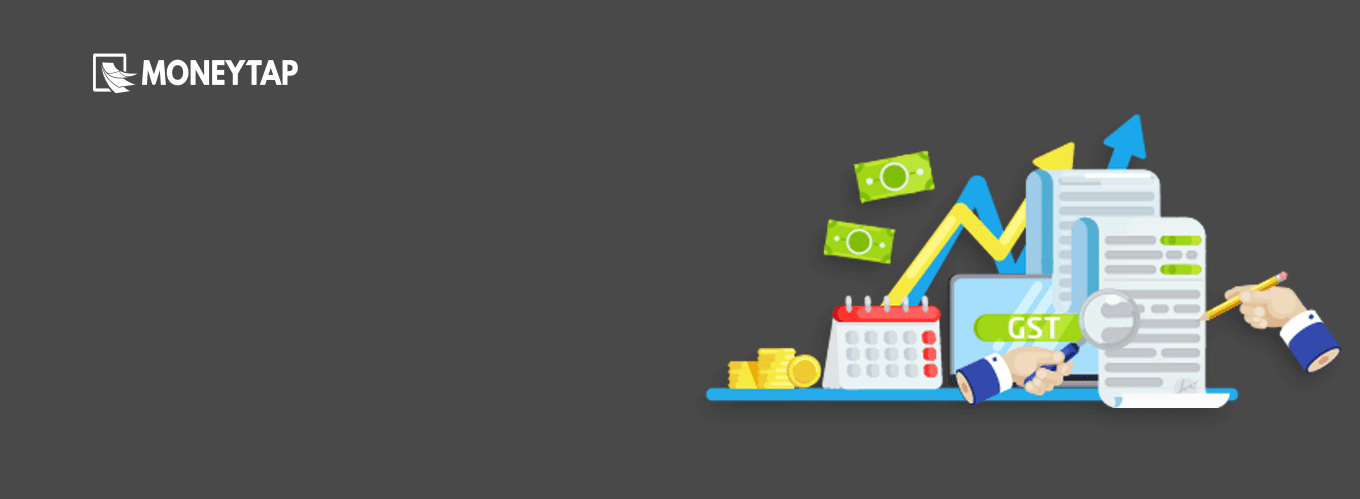GST Basics and Its Impact on Personal Loans
Topic
- Around India with MoneyTap 1
- Consumer Durable 1
- Credit Cards 32
- Credit Score 27
- Finance 33
- General 52
- Know MoneyTap Better 26
- MoneyTap 50
- MoneyTap in Daily Life 38
- Personal Loan 86
- Shopping on EMI 4
- Wedding Loan 1
What is GST?
GST stands for Goods and Services Tax. It is based on One Nation, One Tax concept. GST removes the cascading effect, that is a tax on tax effect on the sale of goods and services, thereby decreasing the cost of goods and services.
The GST was initiated in the year 2000. From then to now, it took 17 long years for GST to come into effect. On 29th March 2017, the Goods and Service Tax Act was passed in the Parliament and the Act came into effect on 1st July 2017.
GST has impacted various industries and the banking sector is one of them. The banking sector provides many kinds of services to its consumers. So, it comes as no surprise that the implementation of GST has had affected the banking sector.
Let’s discuss the impact of GST on a particular financial product, the personal loan.
Impact of GST on Personal Loans
Earlier service tax of 15% was levied on personal loans. The service tax is now replaced with GST, which is at 18%. Looking at the 3% increase in the tax, a lot of people thought that getting a personal loan is more expensive now than before.
But that’s not the case.
GST is NOT applied on loan repayment or interest payment of the loan. Rather it is levied on the processing charges, pre-payment charges, and other personal loan charges paid to the bank or lender.
As the major chunk of personal loan repayment consists of payment of interest and principal, GST’s impact on a personal loan is negligible.
If you are planning to apply for a personal loan to meet your financial needs, you need to understand the impact of GST a little better.
GST on Personal Loans
The banks generally charge a processing fee of 1% to 2% of the loan amount. And the pre-payment fee between 2% to 5%.
Let’s take an example:
Assuming you have a personal loan of ₹ 5 Lakh.
Fees you need to pay the bank for its services are:
- Processing fee of 1% of the loan amount
- Pre-payment fee of 2% of the outstanding principal loan amount
| Bank fees for a personal loan of ₹ 5 Lakh | Amount payable to the bank | Fee payable when Service Tax is applied at 15% (pre-GST era) | Fee payable when GST is applied at 18% (GST era) | Impact of GST (GST minus Service Tax) |
| Processing fees of 1% of the loan amount | ₹ 5,000 | ₹ 750 | ₹ 900 | ₹ 150 |
| Pre-payment fees of 2% of the outstanding principal amount | ₹ 10,000 | ₹ 1,500 | ₹ 1,800 | ₹ 300 |
As you can see from the example above, with GST you are paying ₹ 150 extra on the processing fee and ₹ 300 extra on the pre-payment charges, which are negligible amounts. In conclusion, GST has a minuscule effect on personal loans.
Note: The tax percentage has increased from 15% to 18% (3% increase), but it does not affect the EMI amount. GST is not levied on the loan repayment. It only applies to the services that the bank provides to the borrower for processing the personal loan. GST does not affect the loan repayment and the personal loan interest rate.
Now that you know the impact of GST on personal loans, you should not be under the misconception that GST makes personal loan an expensive finance option. If you need a personal loan, download MoneyTap and get access to funds quickly and at an attractive personal loan interest rate. Get MoneyTap.











 Get it on playstore
Get it on playstore Get it on appstore
Get it on appstore